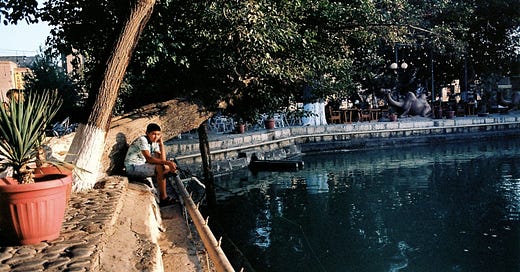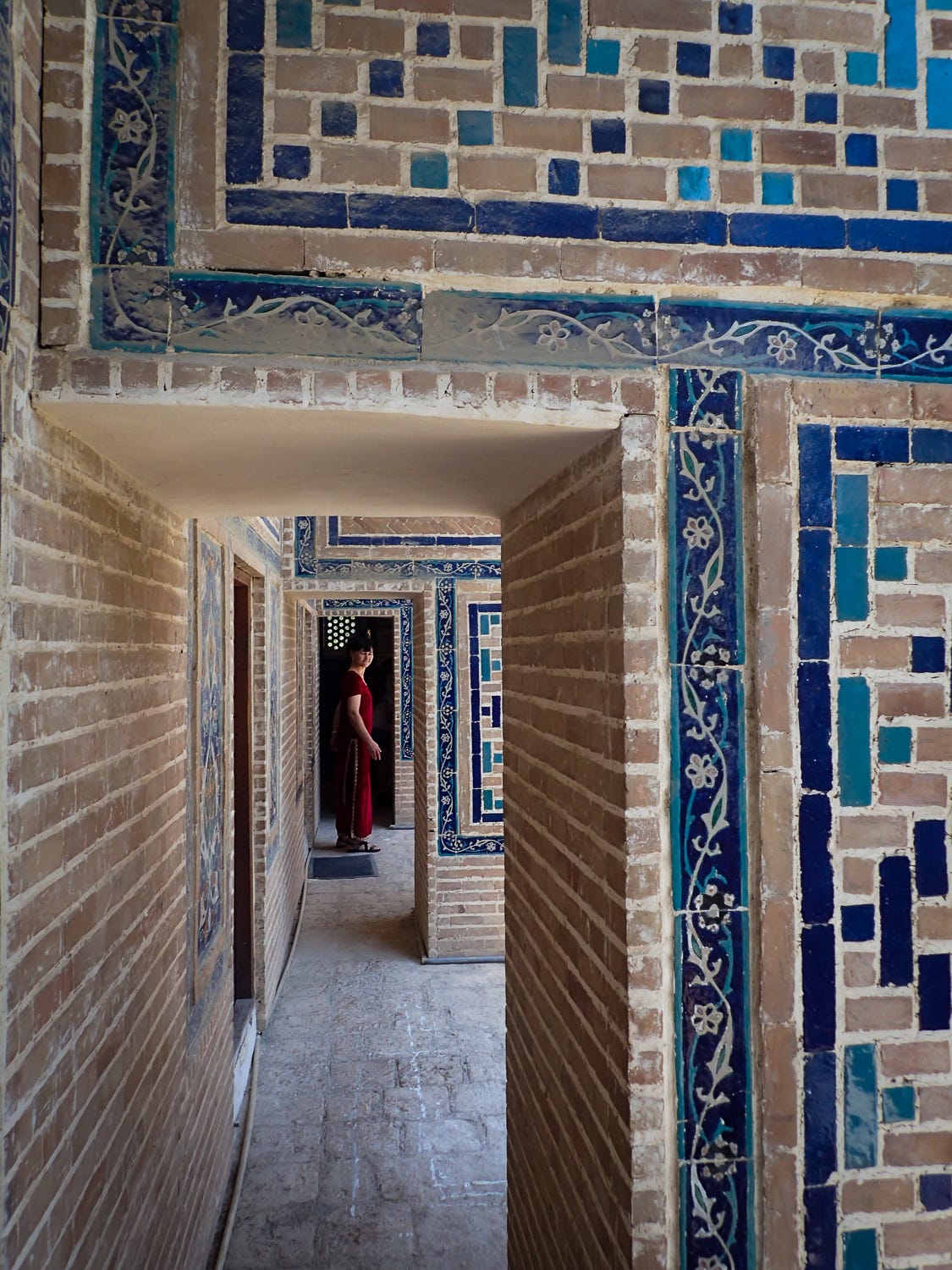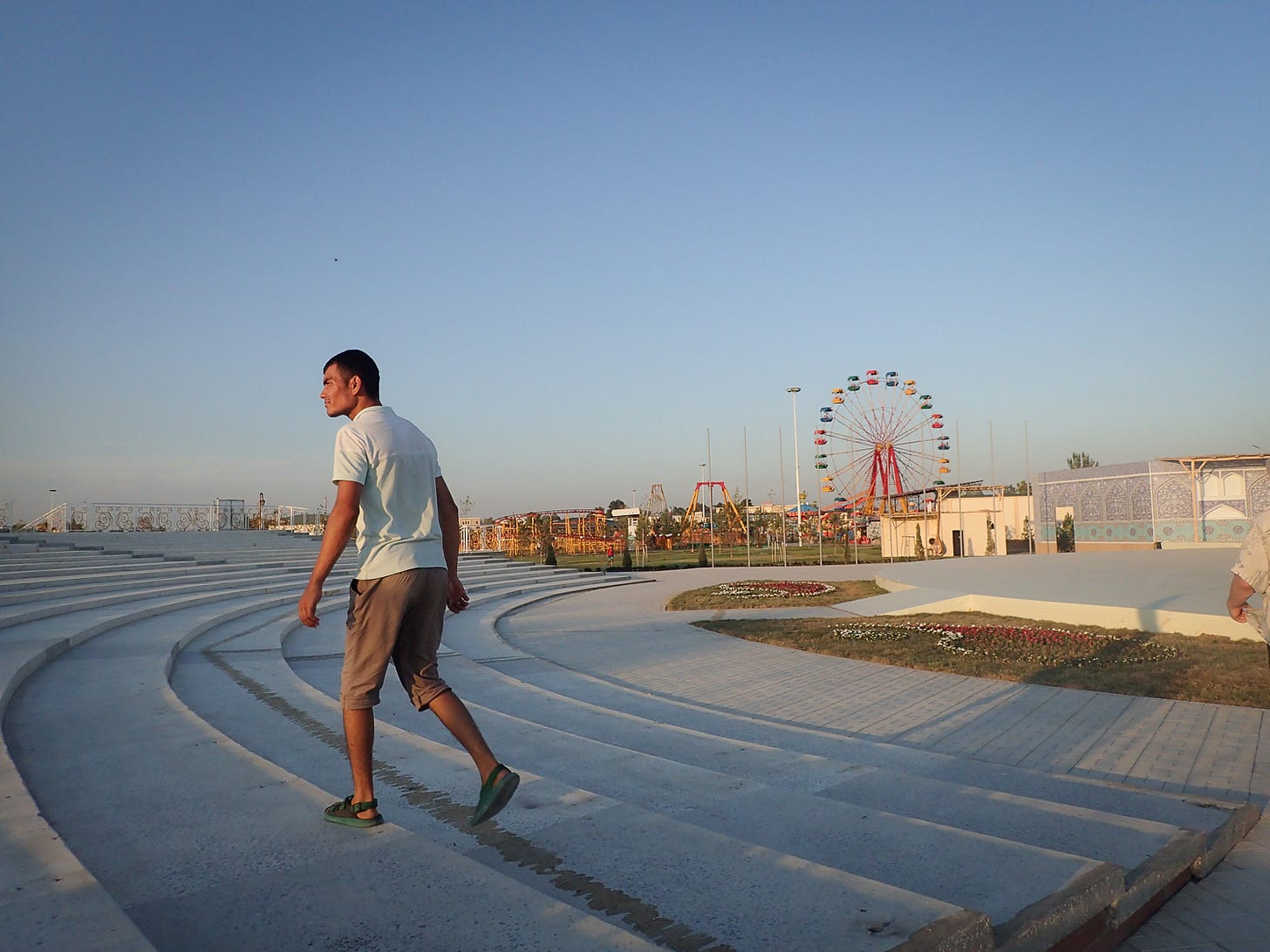Silvery trees wobbled in the reflection as the window wound downward. The black bar grew then revealed two faces. The men said nothing. The passenger looked straight at me, black aviators, black stubble.
I was glad someone had stopped at last. There was no other way out of the South Baltimore rest area. There wasn’t even a shop, just a strong-smelling toilet and a darkening cloud. Regardless, I felt uneasy, the fact no one was saying anything, and the looks, they were hard.
“Err hello,” I said nervously, “Where are you going?”
New York. It was a blunt response, the iron gaze of both men unbroken.
“Hhow much you pay?” asked the driver flatly with an upward nod of a heavy chin. He had a thick accent.
I stammered a bad explanation of hitchhiking.
The two men looked at each other and muttered in Arabic or Russian or a language I didn’t know. Was this really a good idea, I asked myself. There was a strange feeling. There was at least a child on the backseat though. That made me feel better. No they couldn’t be dodgy with a child on the backseat.
“Ok,” the driver nodded again, “Get in.”
I looked at the breeze block toilet and made a snap decision. An old man with a stick stooped back to his car. This was the ride. I’d better take it. New York wasn’t going to come to me.
I opened the back door and got in. It was dark and cramped and tense. Then I realised it wasn’t a child in the backseat. It was another man. All six eyes looked at me.
“Where you from?” The driver said. I heard the doors click.
“London,” I replied, “Where are you from?”
“Uzbekistan.”
“Ahhh no way!” The tension vaporised, replaced by relief. “Where abouts? Samarkand, Tashkent? Bukhara?” The change in mood was physical.
“You know it?”
I did. I’d been I told them. You’ve been! No way! The atmosphere lightened, became suddenly jovial and easy. Everyone relaxed. It was like discovering we had a mutual friend.
The driver was called Dilshod, the passenger with the aviators, Joxorginr. Khalil, the young man next to me was slid back in his seat, legs folded against the chair in front. I tried several times to remember their names.
Dilshod was the most talkative. “I have never heard of this ‘hitchhiking’,” he announced, speaking with a steady monotone, “I did not know this concept. But something in my brain made me go slow and stop. I don’t know what!” He tabbed his temple with a large finger, “Maybe it was fate."
The three men were driving back from Tennessee. Brooklyn was their home but they’d been to a wedding. Dilshod was a wedding MC, Joxorginr a singer. Joxorginr didn’t register the mention, his aviators fixed to the front. I tried to imagine him singing.
Neither of them were paid for it. It was a hobby, Dilshod explained, a connection to home. Dilshod was a lawyer by training, with a master’s from a good university. He was revising to take the Barr exam and used his training to represent Uzbeks and give advice where needed. He liked to help the community.
Khalil meanwhile worked in a restaurant in Manhattan. He’d been in New York for a year, having studied business in Latvia before that. He was there four years though he never completed the degree. Khalil told me he preferred Europe to New York. America was too full on, there was always so much happening it was overwhelming.
I asked what he’d been doing at the wedding. Nothing, he replied. Joxorginr had convinced him to go. They’d hoped he’d find a wife.
“Any luck?”
“No,” he said a little dejected.
“I guess there’s no rush,” I replied, “You’re only 24, there’s plenty of time.”
Dilshod interjected from the front. He disagreed. You couldn’t leave it too late. He began a story about an old man he once knew, Dilshod had a story for everything. Just what you want for a long car journey. “I met him when I was a taxi driver when I first came to New York. He was 85 and lived on his own with no wife, no family, nothing. I’d drive him to see his friend’s grandchildren. One day I says to him aren’t you lonely with no wife and family? And he says he wasn’t. Those children were like grandchildren to him. But I think he was. It was sad.”
“There’s plenty of years between 24 and 85 though I suppose.”
We all agreed Khalil would find a wife and Dilshod explained that family was the most important thing. That and community. I asked how he had met his wife.
“Ahah! It’s a very funny story actually,” he replied beginning another story, “I had a friend from school, an old classmate called Rahkmadteller,” his plodding voice pulled like a freight train, “We had not seen each other for ten years but he had saved his number on my phone under Rahkmadteller. One day I decided to phone him. It rang and rang and then a woman picked it up. ‘Can I speak to Rahkmadteller please,’ I says very politely but the woman, she says she doesn’t know who Rahkmadteller is and she starts shouting down the phone!
“I was very polite and explained who I am. ‘I just want my friend Rahkmadteller, I know you know him…’ I didn’t believe her, but she keeps shouting shouting and then she hangs up!”
Over the course of the next few months, Dilshod kept phoning the number, convinced the woman did know Rahkmadteller and was denying it for some reason. He became fixed on discovering why. Again and again she shouted at him and hung up. Eventually though as the months went by the shouting became less aggressive, the conversations longer and more civil. One day they agreed to meet.
Dilshod returned to Bukhara, and they were soon engaged. In Uzbek culture, Dilshod continued, he left no details from his stories, the groom sends an ambassador to the bride’s parents to seek consent. It took a while to convince them, but in the end, the parents agreed. Dilshod and his wife have been happily married for the eight years since.
“What happened to Rahkmadteller?”
“I don’t know. I never saw him! It was all a coincidence. What happened was Rahkmadteller got a new phone nearly ten years ago. After some time, the telephone company reused the old number and they gave it to my wife when she bought a phone. She wasn’t lying, she’d never heard of Rahkmadteller in her life!”
“Wow. Certainly beats Tindr,” I said.
“Yes.”
They told me about the Tennessee wedding. It had been a fairly small affair, 120 people or so, and a great success, a fine groom and a beautiful bride. Joxorginr had sung well and Dilshod performed his duties perfectly.
I’d told them I’d been to an Uzbek wedding before. “What was it like?” they asked, signalling it was my turn to tell a tale.
A friend and I were walking through Fergana, the capital of the Fergana valley, city of silk and home to the great Ferghana horses. They knew the town.
Music was playing from inside a building and men were smoking outside it. Somehow we got talking and for some reason they took us inside. A wedding was in full swing, a dozen round tables spread with food and vodka, guests leaning over chairs, noise and revelry. The bride and groom were seated in the corner under a golden arch covered with flowers.
Doug and I were shown two seats at a table. The feast was well underway, only fruit was left but we were given some and given vodka too, plenty of it.
We drank shots and gesticulated with our table-mates. We shared no mutual language besides the most fundamental one. After a while the MC came over to us and took us up to the stage, putting the microphone in my hand. Suddenly the room went quiet. I only had a choice of the three Uzbek words I knew. I picked “Rakhmad”, thank you. The microphone was taken away but faces remained fixed on us expectantly. The band struck up behind. Doug and I looked at each other and realised we’d better dance.
We hopped and skipped, swung hands and flapped feet, spun each other round and round and round and clapped for good measure. We grinned stupidly until we were shining with sweat. The faces looked back at us still unmoved, impossible to read. Not a single smile. After a few minutes of increasingly feeble kicks, somewhere between a cossack’s and the can-can, a little boy came forward with a handful of notes. A procession of infant donations began until we suddenly found ourselves rich. The money was for the band. Relieved and exhausted we sat down, vodka thrust in our hands. The party continued and we left with a car dealer called Johnny.
“Yes,” Dilshod said seriously when I finished the story, “Uzbeks are very accommodating...”
It reminded him of another tale. What is hitchhiking after all but the sharing of stories? This one was about Dilshod, a rich man and a strip club.
To be continued.







‘What is hitchhiking but the sharing of stories’… thank you for sharing this one Nico! Really enjoying US episodes.
Another captivating read. Great work Nico!